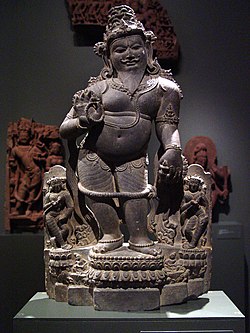
Back أدب سنغمي Arabic সঙ্গম সাহিত্য Bengali/Bangla Literatura sangam Catalan Sangam-Literatur German Literatura sangam Spanish ادبیات سنگام Persian Sangam-kirjallisuus Finnish Littérature tamoule classique French संगम साहित्य Hindi Letteratura Sangam Italian

The Sangam literature (Tamil: சங்க இலக்கியம், caṅka ilakkiyam), historically known as 'the poetry of the noble ones' (Tamil: சான்றோர் செய்யுள், Cāṉṟōr ceyyuḷ),[1] connotes the early classical Tamil literature and is the earliest known literature of South India. The Tamil tradition links it to legendary literary gatherings around Madurai in the ancient Pandya kingdom. It is generally accepted by most scholars that the historical Sangam literature era, also known as the Sangam period, spanned from c. 100 BCE to 250 CE, on the basis of linguistic, epigraphic, archaeological, numismatic and historical data; though some scholars give a broader range of 300 BCE to 300 CE.[note 1]
The Eighteen Greater Texts (Patiṉeṇmēlkaṇakku), along with the Tamil grammar work Tolkappiyam, are collectively considered as Sangam literature. These texts are classified into the Ettuttokai (Eight Anthologies) and Pattupattu (Ten Idylls). They encompass both Akam (interior) themes, focusing on personal emotions and love, and Puram (exterior) themes, emphasizing heroism, ethics, and societal values. Notable works include Akananuru (400 love poems), Purananuru (400 heroic poems), Kurunthogai (short love poems), and Natrinai (poems set in five landscapes). The Pattuppāṭṭu highlights specific regions and rulers, with works like Malaipadukadam and Perumpanarrupadai serving as guides to wealth and prosperity.
The Sangam literature had fallen into obscurity for much of the 2nd millennium CE, but were preserved by the monasteries near Kumbakonam. These texts were rediscovered and compiled in the 19th century by Tamil scholars, notably Mahamahopadhyaya Dr. U.V. Swaminatha Iyer. Over five decades, Iyer undertook extensive travels to locate palm-leaf manuscripts, leading to the revival of ancient Tamil history, including insights into the Chera, Chola, and Pandya kingdoms, Tamil chieftains such as Pari, and the rich descriptions of Sangam landscapes and culture.
- ^ K Kailasapathy (1968). Tamil Heroic Poetry. Clarendon Press. p. 1. ISBN 9780198154341.
Cite error: There are <ref group=note> tags on this page, but the references will not show without a {{reflist|group=note}} template (see the help page).
© MMXXIII Rich X Search. We shall prevail. All rights reserved. Rich X Search